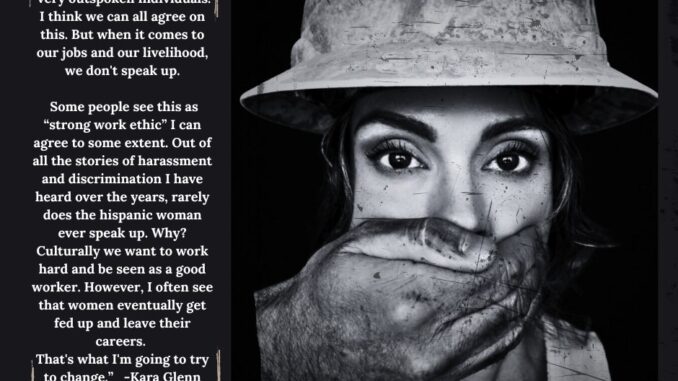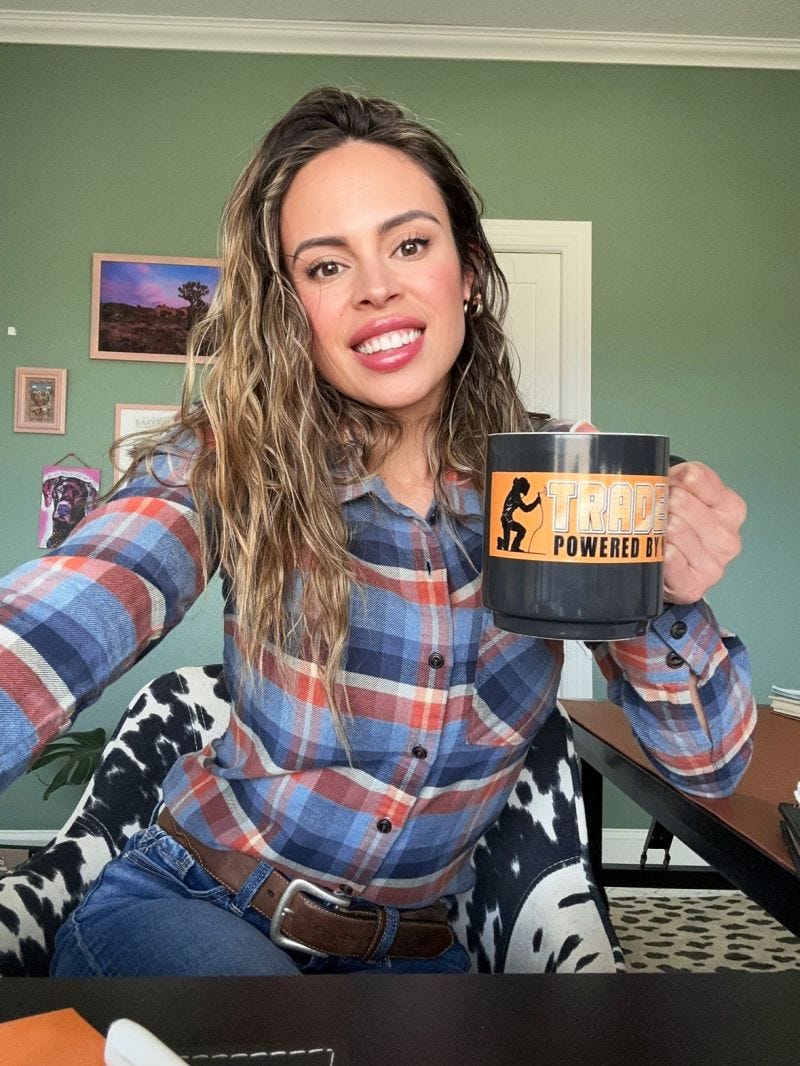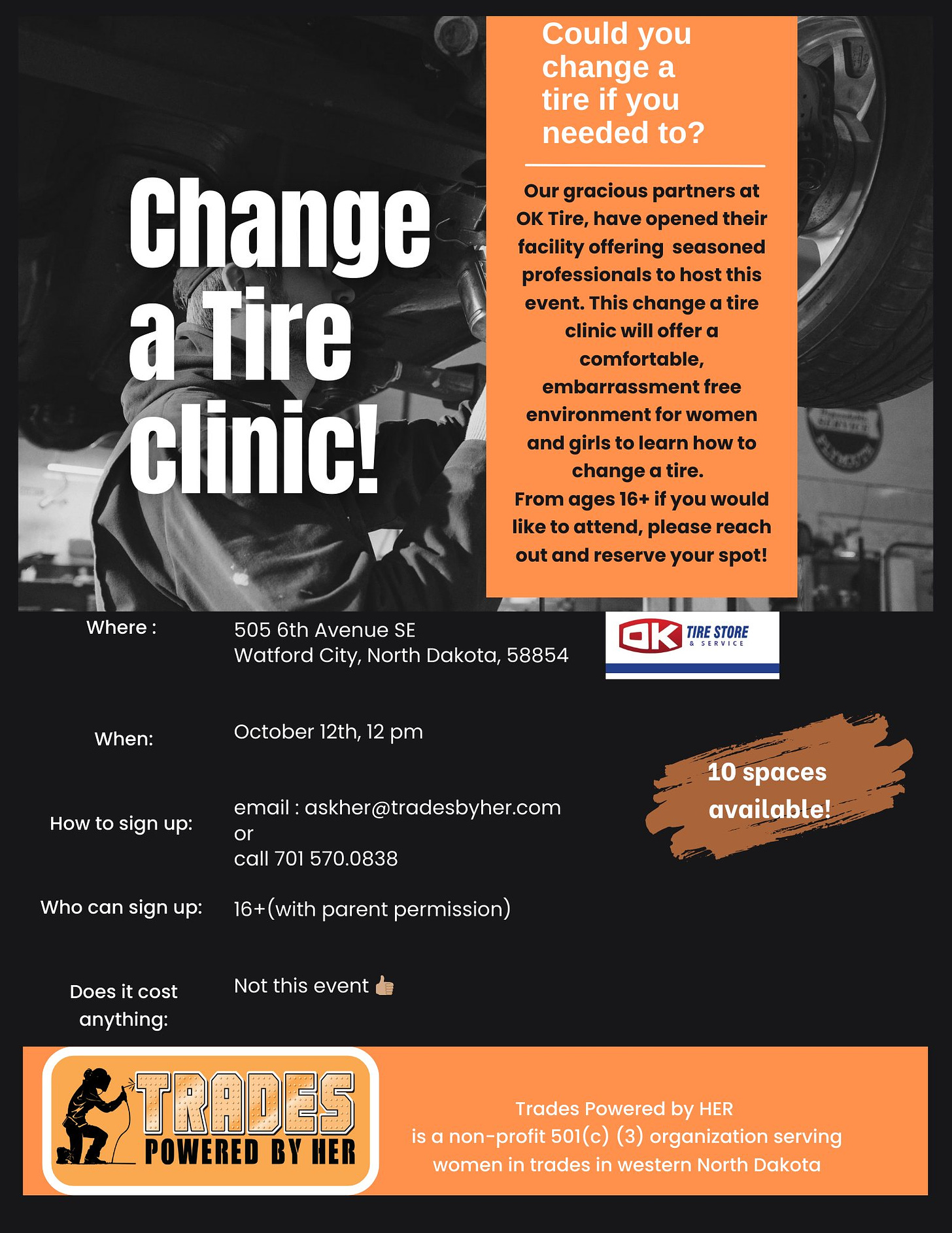

Trades Powered By Her is a 501(c)(3) non-profit organization based in Watford City, North Dakota, with a mission to empower and support women in trades. Founded by Kara Glenn, this organization aims to break barriers and open opportunities for women to excel in traditionally male-dominated fields such as construction, welding, electrical work, and more.
Kara Glenn is a creative professional and educator, known for her work in welding and helping women understand trades, specifically oil and gas.
She has applied her background and leadership skills to this initiative, striving to provide women with the necessary tools, training, and resources to thrive in the skilled trades industry.

Through workshops, mentorship programs, and community outreach, Trades Powered By Her promotes gender equity in the workforce by enabling women to gain technical skills, confidence, and job placements in the industry.
In addition to educational support, the organization fosters a sense of community among women in trades, offering networking events and collaborative projects. This helps create strong bonds, ensuring that participants not only succeed individually but also lift each other up within their professional journeys.

By empowering women through education and advocacy, Trades Powered By Her plays a crucial role in advancing gender inclusivity in the trades sector across North Dakota and Texas.
Women have been entering trades like welding, construction, plumbing, and electrical work for decades, yet their numbers remain relatively low compared to men. These fields have long been perceived as male-dominated, partly due to historical exclusion, societal norms, and workplace cultures that have often been unwelcoming to women. However, women in these trades have made remarkable strides, breaking barriers and reshaping the industries they work in.
A Historical Look at Women in the Trades
Women’s participation in trades can be traced back to the early 20th century, especially during times of war. During World War II, women famously took on industrial jobs to replace men who were off fighting, a movement symbolized by “Rosie the Riveter.” Welding, in particular, became a prominent trade for women during this time as they contributed to shipbuilding and munitions production. Over six million women joined the workforce in roles previously reserved for men, leaving a lasting impact on gender roles in labor.
Yet, after the war, women were largely pushed out of these jobs as men returned, and it would take decades for women to re-enter trades in significant numbers. During the 1970s and 1980s, as women’s rights movements grew, trades like welding and construction became more accessible to women, albeit slowly and with persistent cultural resistance.
Women Welders and Trades Today
Despite increased opportunities, women still make up only a small percentage of workers in industrial trades. For instance, as of 2020, women comprised only about 5% of welders in the United States. Similarly, women represent 9.1% of the construction workforce and hold less than 10% of roles in many other trades, like plumbing and electrical work. These numbers illustrate the challenges women still face when entering these professions, even as the need for skilled labor continues to grow.
Cultural and Workplace Challenges
The underrepresentation of women in trades stems from a variety of cultural and systemic issues. Below are key challenges they face:
- Workplace Harassment and Discrimination Women in male-dominated industries often report harassment, ranging from sexist comments to more severe forms of discrimination. A 2019 study by the Institute for Women’s Policy Research found that women in these industries experience harassment at higher rates than women in other fields. This hostile environment can deter women from entering or staying in trades, where they may feel isolated or unwelcome.
- Bias and Stereotypes Trades like welding and construction are physically demanding, and women are often stereotyped as being less capable of handling such work. Many women welders face the assumption that they cannot perform the job as well as men, despite evidence to the contrary. Women who thrive in these roles often have to constantly prove their competence, a burden that their male counterparts do not face.
- Lack of Female Role Models and Mentors With so few women in trades, finding mentors and role models can be difficult. Having visible, successful women in leadership positions can make a significant difference in how younger women view their potential careers. Organizations like the Women in Welding Mentorship Program and NAWIC (National Association of Women in Construction) have been crucial in creating support networks for women, but the lack of representation remains a challenge.
- Gender Pay Gap The gender pay gap persists even in trade industries where pay is often determined by skill level rather than tenure. On average, women earn less than men in similar roles. Though wages in trades like welding can be lucrative—often surpassing $40,000 to $50,000 annually—women are still paid about 20% less than their male counterparts in some cases.
- Balancing Family and Work Many women in trades struggle with balancing demanding jobs and family responsibilities. Trades often involve irregular hours, long shifts, or travel, making it harder for women who have caregiving responsibilities. While this is also an issue for men, societal norms often place a greater burden on women to handle child-rearing or eldercare.
Breaking Barriers and Changing the Narrative
Despite these obstacles, women welders and tradeswomen are breaking new ground, bringing fresh perspectives and skills to their industries. In fact, women are often praised for their attention to detail, precision, and problem-solving skills—traits that make them particularly successful in trades like welding and electrical work.
Programs and Advocacy
Several organizations and initiatives are working to close the gender gap and improve conditions for women in trades. Some notable efforts include:
- Women Who Weld: This nonprofit organization provides training and certification for women interested in welding, offering both introductory courses and advanced instruction. By creating a supportive environment, Women Who Weld empowers women to pursue careers in welding with confidence.
- Tradeswomen, Inc.: One of the oldest advocacy organizations for women in trades, this group focuses on recruitment, retention, and leadership development for women in construction and other skilled trades.
- Sisters in the Brotherhood: A women’s organization within the United Brotherhood of Carpenters and Joiners of America that seeks to recruit, train, and mentor women in carpentry and related fields.
Success Stories: Pioneers in the Field
Several trailblazing women have helped reshape their industries and become role models for future generations.
- Barbie Parsons: A welding instructor from Washington state, Barbie is known for her welding artistry and her advocacy for women in the trade. Her efforts to mentor young women and challenge the status quo have earned her a prominent place in the industry.
- Judaline Cassidy: A pioneer in plumbing, Cassidy has been in the trade for over two decades. She is the founder of Tools & Tiaras, a nonprofit organization that introduces girls to skilled trades through hands-on workshops.
These women have not only overcome the barriers of working in male-dominated industries but have also paved the way for future generations to do the same.
Changing Attitudes and the Future of Women in Trades
Attitudes toward women in welding and other trades are gradually changing. As the workforce ages and the demand for skilled labor rises, industries are increasingly recognizing the value that women bring. The advent of technology and automation in trades, like advanced welding machines and digital tools in construction, has also made physical strength less of a factor, allowing women to thrive in these environments.
Moreover, companies are becoming more aware of the importance of diversity and inclusion. Some firms are actively recruiting women, offering training programs, scholarships, and support networks to ensure their success in traditionally male-dominated roles.
Conclusion: Building a New Legacy
Women welders and tradeswomen are rewriting the narrative of what it means to work in industries like welding, construction, and plumbing. Despite significant cultural and systemic challenges, women are increasingly making their mark, breaking down stereotypes, and reshaping the future of these trades. With the help of advocacy groups, mentorship programs, and changing industry attitudes, the future looks promising for women in the trades. The work continues, but each new generation of women welders and tradeswomen brings the industry closer to a more inclusive and equitable future.
CLICK HERE FOR SPECIAL DISCOUNT LINK
Half the price, all the fun. Get 50% OFF any Paramount+ annual plan for a limited time! Take advantage of the fall offer and start streaming…

Take advantage of this limited time offer and stream the NFL on CBS live on Paramount+. Redeem now!
Everyday your story is being told by someone. Who is telling your story? Who are you telling your story to?
Email your sustainable story ideas, professional press releases or petro-powered podcast submissions to thecontentcreationstudios(AT)gmail(DOT)com.
#thecrudelife promotes a culture of inclusion and respect through interviews, content creation, live events and partnerships that educate, enrich, and empower people to create a positive social environment for all, regardless of age, race, religion, sexual orientation, or physical or intellectual ability.
MORE FROM THE CRUDE LIFE
- Please click that ♡ button, share, and subscribe.
- Please share the links on social media.
- Thank you thank you thank you for your engagement and support.
If you have a news tip, press release, guest suggestion or other content concepts, please email thecontentcreationstudios(AT)gmail(DOT)com
This post was brought to you in part by one of The Crude Life’s fantastic sponsors, please consider supporting their services or learning more about their organization by clicking on the banner below.

Blockchain For Energy (B4E)
The Blockchain for Energy (B4E) consortium provides its members with forward thinking learnings and solutions. It collaboratively drives digital transformation by providing members with opportunities to accelerate their digitalization journey.
Through collective synergies, B4E seeks to resolve, reinvent, and transform the industry’s standard ways of working with external parties.
Blockchain for Energy is a safe venue to create transformational change – for the energy industry – by the energy industry. Current B4E members and collaborators include Chesapeake Energy, Chevron, ConocoPhillips, Devon Energy, ExxonMobil, Repsol, Saudi Aramco, Schlumberger, Enovate AI, Emerson ZEDI, Hedera, GBBC/IWA and Tolam Earth.

